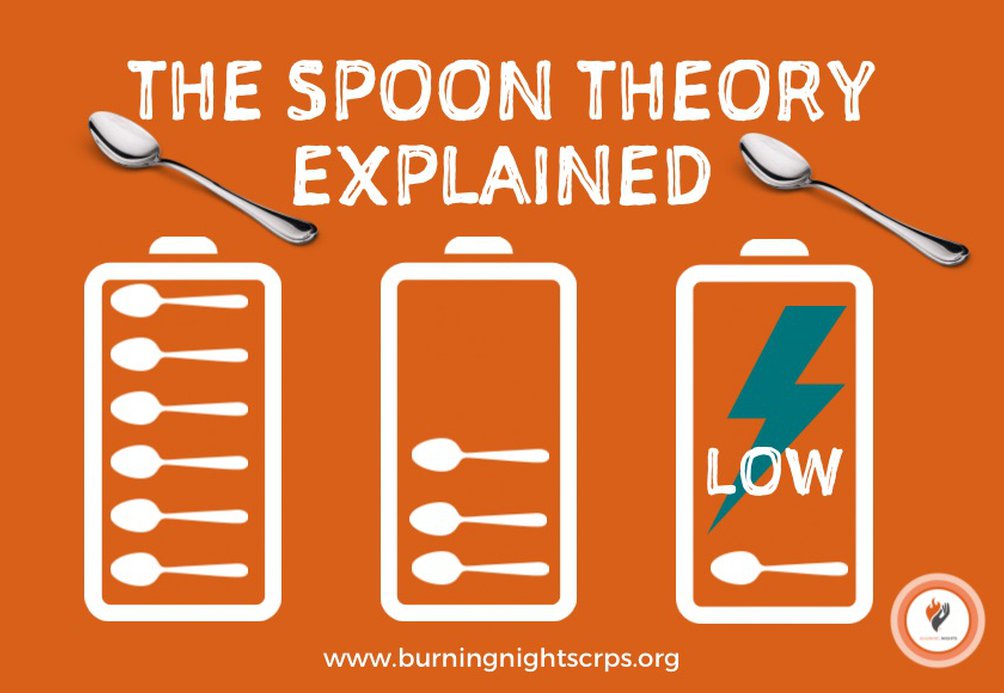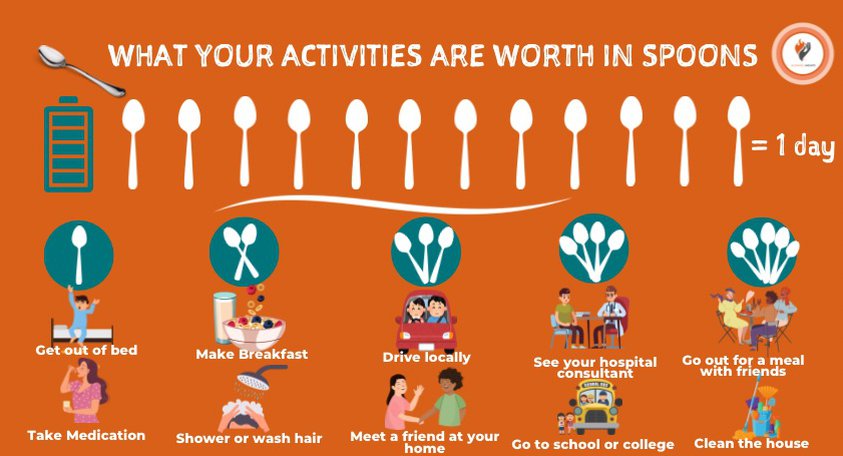We use cookies to improve your experience. By accepting you agree to our cookie policy

One of the most frustrating things about living with chronic pain or a chronic illness, is the struggle to get able-bodied people to understand the extent and impact that your pain has on every part of your life.
That very problem was what prompted lupus patient Christine Miserandino to create the Spoon Theory to help explain chronic illness, which is a striking metaphor that has since been adopted globally as the most vivid interpretation of life with chronic illness.

Spoonies is a term used by people who have a chronic illness, chronic pain or a disability who usually identify with the 'Spoon Theory' for example people living with Complex Regional Pain Syndrome (CRPS).
You may have heard or read phrases like "Spoon Theory" or "Spoonies" when people talk about chronic illness including Complex Regional Pain Syndrome (CRPS). But what does the Spoon Theory for chronic illness mean?
Living with chronic pain, like CRPS, is draining. It often requires careful management of your daily activities to adjust to and predict your pain levels. This pain, along with the challenges of handling it, can affect both your mental and physical capacity. It can also be difficult when trying to explain how much your chronic illness impacts on you and your health. This is where the Spoon Theory for chronic pain comes in.
Healthy people have an unlimited amount of energy, but those of us with a chronic illness or chronic pain will have a limited amount of energy. When Christine created the Spoon Theory for chronic illness, she used the analogy of spoons being her units of energy, and each spoon represents the amount of effort or energy that activity takes you to complete. The more spoons an activity has, the more energy that someone with chronic pain has to use to complete that activity.
Spoon Theory can also be a great tool to help you to pace yourself if you find pacing for your chronic pain or CRPS difficult..
You start the day with a certain amount of spoons which are to last you throughout the day ie. 12 spoons, enabling you to complete your daily tasks or activities whether they are mental or physical tasks. Smaller tasks like taking your medication will have a smaller number of spoons but larger tasks such as cooking will take more spoons.
If you're experiencing a flare up of your chronic pain or chronic illness this may mean that even the smallest activities will take more spoons than usual, and you may start the day with even less spoons.
By using the Spoon Theory for chronic pain and having a limited amount of spoons to use throughout the day, will help you pace yourself and should help you learn to cope with your chronic pain or chronic illness.
As someone with chronic pain, you start each day with 12 spoons. You can 'borrow' spoons from the next day but remember that will leave you with a shorter number of spoons for the following day.
A healthy person has unlimited number of spoons.
You will find plenty of images giving you examples of what each activity is in spoons, but you can choose your own number of spoons required for specific activities. You are the only person who knows how much energy it takes to complete a task as someone with chronic pain or a chronic illness. If you are having a high pain day then you may not have 12 spoons to start the day and you may need to use your spoons differently.
Here are some examples of how you can use your spoons for various activities.

The Spoon Theory suggests that you can restore your spoons usually when you sleep. However we know how difficult sleep can be for those living with chronic pain and Complex Regional Pain Syndrome (CRPS). Some Spoonies use caffeine to restore their spoons, others find that having a short 20-30 minute nap during the day may help to restore spoons. But remember that this doesn't work for everyone, so it's finding what works for you.
In a way, restoring your spoons is the same as self care. Find ways that gives you some self compassion and a chance to give yourself a break. Here are some examples of ways you can restore your spoons for chronic pain:
It's important to remember that pushing through your chronic pain to find some 'hidden' energy so you can complete an activity isn’t always the best answer. It is important to listen to your body. When you live with chronic pain, it's perfectly okay and normal to have days where you’re running low on spoons. So, just take a step back, and put your needs first.
Self care is not selfish.
Our Spoon Theory infographic details what the Spoon Theory for chronic illness is, which chronic illnesses the Spoon Theory can be applied to, how the ‘spoons’ are used during the day, some advice for ‘spoonies’ and the Spoon Theory from ‘spoonies” perspectives. Why not show your friends and family the Spoon Theory infographic to help explain your chronic illness?

We use cookies to improve your experience. By accepting you agree to our cookie policy
 £
£